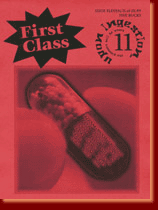


HOME SCHOOLING
by B.Z. Niditch
The parents kept Marvin in the crib until he was twelve. He was kept in diapers and ate only zwieback and pablum.
Only because Marvin's large head kept getting stuck in the crib did the parents, Seymour and Gigi, think of taking him out. They felt protective.
The only reason Gigi was worried was because of one neighbor, Mrs. Wise, who kept on asking about Marvin and how he was doing in school. No one else paid much mind to Mrs. Wise, but she had lived in the apartment building for thirty-five years and had a reputation for being a busybody.
Marvin suddenly shot up when he was eleven and a half. He spoke well and was well-read if innocent. Seymour was teaching him from the Great Books of the Western World, St. Augustine, St. Thomas, Pascal, Descartes, and the later Tolstoy.
Seymour was a teacher himself; his parents who worked like slaves in their haberdashery store died within a year of Marvin's birth and left them independently wealthy, though they lived modestly.
Marvin longed to get outdoors but Gigi had deep fears for the boy -- dogs, and school, which she hated, having only barely graduated because of her weight problem, going from obese to skinny during her junior year, when she met Seymour in science class. He had exploded a miniature A-bomb, the teacher said. That won him to the rebellious heart of Gigi.
They had to get married after experimenting with sex and his parents grudgingly gave in. Marvin was born a preemie and the couple vowed eternal protection and separation from the awful world of their growing up. Gigi's father was in the Navy and they travelled and moved fourteen times until he divorced and went to live with a young man, and the mother married a former German pilot in the Luftwaffe who used to want to play Blitz or concentration camp with her. The London Blitz involved Hans making rockets out of his own urine and throwing them out the window, and concentration camp was about his playing a commander and giving orders to her mother and her with sexual overtones.
It was rumored that Gigi's mother was thrown out the window, but the coroner's report ruled it was a simple suicide.
Gigi ran away from home many times until her Aunt Lucy brought her here to Brooklyn where she met Seymour at Erasmus High.
Marvin at twelve still wore baby clothes and bib, but had a genius mind. He had just learned toilet training and how to feed himself, but it was slow, because Gigi used to like to feed him herself, sometimes with one broccoli stick or pea at a time.
"Daddy, can we read Einstein today?"
"Of course, Marvin, after we go through your Latin and Greek."
"But dad...can't I ever go out?"
Seymour looked white, thinking of his son on the street with the noise, violence and hatred around him. Seymour wanted his son to have a home school education unpolluted from the world, to make up for his losses, having had to work in his father's store since he was nine till sixteen, when Heckleman's Haberdash became the "in" place.
"Where did you ever think of leaving us, Marvin? You know you are different from the other boys; your mother told you how she was bit by a dog, had to hide from bad people, how scary the night air is, and all the sickness outside."
Marvin is playing with a computer chess set.
"I know, but I was just thinking."
"It's fine to think, but you have work to do. It's Caesar and Plato today."
Gigi comes in from shopping.
"Ma, no more rattles. I've got one for every day of the year."
"I saw that Mrs. Wise snooping around here."
Gigi, out of breath, puts down her shopping bags and kisses Marvin.
"She asked for you, Marvin. You don't talk to her, do you?"
"Just on the telephone."
Seymour's face is angry and his lip quivers, but he tries to act nonchalantly.
"Oh, when is that?"
"For years. She's like a grandmother to me."
Gigi's eyes well up.
"A grandmother? She knows; I know she knows. Seymour, we've got to do something, and soon."
"What can we do, Gigi?"
"Poison her, kill her; threatening won't do her any good! It didn't work for me growing up."
"But honey, that won't solve anything. Let me take care of everything."
"You say that, Seymour, but you don't do anything but teach..."
"That's my life, to instill values..."
"Shut up! We'd better be careful or the State snoops will take the kid away."
"I couldn't live without Marvin. He's my security blanket."
"He's my doll; aren't you, Marvy?"
"Mrs. Wise sent me over steak and potatoes."
"Since when?"
"For years, when you went out. She thinks it's disgusting, all that pablum and sugar pops. Her grandson Mickey gave me some weights and Playboy."
"I'll take care of Mrs. Wise."
"She takes care of me, Mom. Don't you hurt her."
"But we love you. You are our whole life. We sacrificed for you, even our happiness, just so you could have us."
"I want Mrs. Wise! I want Mrs. Wise!"
Marvin puts on his radio and listens to short wave and punk rock.
"And who gave you that?"
"Mickey...and Mickey is coming here to take me away."
"But he's nothing but a playboy himself, a low life, a spoiled brat who lives off his grandmother."
The door bell rings.
Seymour and Gigi take poison tablets from the desk.
"I tried my best for you, Marvin," says Gigi before popping the pills; "now you go out into the world and kill 'em."
Marvin runs out the door to Mickey, who gives Marvin a piggyback ride over to Sheepshead Bay.
EIGHT APARTMENTS
by Mark Senkus
the pigeons
used to flock
around the roof
a few built their nests
under the crook
and then the fire
wiped out the entire complex;
eight apartments above
a sleazy dance bar,
all gone to cinders,
and most of the pigeons
disappeared
but a few came back
looking for their nests
and the homeless tenants
came back to look
at what
was left
and I stood there looking
at what would have been
my apartment
but I had moved out
two days earlier because
I couldn't come up with the rent anymore
and I drank a cold beer over at
a woman's place
where I was keeping
my duffle bag of clothes
and a small box of books
and scrounging for a meal or two
and I couldn't help but feel
lucky
for having been broke;
I felt luckier than the pigeons
and the homeless tenants
and the landlady and
the bar owner;
I wouldn't have lost much,
but my luck, at least, let me
hold onto it.
THE UNABOMBER TELLS ALL
by Jody Azzouni
It's usually true, I guess, ex nihilo, nihil fit;
but not in set theory. There, in the beginning:
innocent ø,
but {nothing up either sleeve: for notice
the quote marks to come}: 'e', a lonely
chunk of hieroglyph, and presto, a universe.
Admittedly, it's only set-theoretic {although
with transcendental ellipses}; and,
admittedly, brackets are needed
{the mathematician's trip wires};
but we know singularities {of whatever sort}
are by law tricked into giving birth.
We all begin small, don't we?: I started out
that way: trying to divide by 0; for I noticed
the essential thing: the smaller
the denominator, the bigger the quotient.
Somehow {wouldn't you know it?} 0 is just
too small; oo just too close.
But there's the key, right? Rapid growth?
Think of the insidious f(x)=ex; boy,
does that start out slowly {logarithmically so}.
Get to 1, however, and suddenly it's all in a rush
{surpasses every polynomial, as it turns out}.
Don't get the impression that my interest
in the relative growth of functions is purely formal.
Explosions have implications, moral ones, no doubt. But
these are perhaps just details, just
a question of what remains after we've squashed flat
the singularity, smeared it out across the furniture
of the world: given {along the way} an academic
or 2 a new slant on the means of production
{the luddite irony of the prothesis}.
Do I sound cold-blooded? You forget
the ascetic beauty in all this:
Call it an idealization if you will:
starting from a real point {no width, no length,
no depth} and expanding in 4-space
{the equations nonlinear; forgive me
if I omit them}. Think of something like
a radially expanding sphere
muscling its way through its recipient,
its volume swelling as of r3,
its surface area as of r2. But I digress.
Did I answer all your questions? Probably
not. You'd like to know: Do I drink? was
my mother kind to me? why didn't my brother
want all that money? did I use a hammer
when I built my house? do I have regrets?